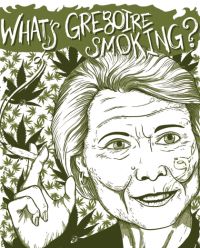Washington moves to license marijuana dispensaries, feds react
 | | Christine Gregoire, from Cannabis Defense Coalition |
Toke of the Town calls Governor Gregoire "Chicken" for asking for federal permission before fully backing the new legislation.
The feds are throwing their weight around again when it comes to Washington state's medical marijuana law. A proposal to rewrite the state's medicinal cannabis rules attracted federal attention after Governor Christine Gregoire asked for "clear guidance" about the U.S. Department of Justice's position on state-licensed medical marijuana dispensaries, which would be legalized under the new rules.
Gov. Gregoire, who sent the letter to U.S. Attorney General Eric Holder on Wednesday, claims she "became concerned" about a "potential federal crackdown" after speaking with the U.S. attorneys for Eastern and Western Washington, Michael Ormsby and Jenny Durkan, reports Jonathan Martin at the Seattle Times.
The prosecutors claim they are concerned that the proposed legislation "would legalize commercial sales of marijuana," according to state Sen. Jeanne Kohl-Welles, the bill's prime sponsor.
U.S. attorneys Ormsby, who already started threatening Spokane dispensaries last week, and Durkan noted that the U.S. attorney for Northern California was threatening to prosecute operators of a proposed commercial grow farm in Oakland, even though the farm was licensed by that city and legal under state law, Gov. Gregoire said in her letter to the Attorney General.
The bill in question, SB 5073, would create new state licenses for dispensaries, grow farms and cannabis food processors. State licensing of dispensaries is already in place or is currently being implemented in states like Colorado, Maine, New Jersey and New Mexico, as well as in the District of Columbia.
|

Recently @ DoseNation
|
|






















* Places ten new requirements on health care professionals who recommend medical cannabis. Disallows health care professionals from running "medical cannabis only" clinics, or from making any statement on the medical use of cannabis in any advertisement for their practice. Violations would be findings of unprofessional conduct, and the punishments may include per-violation fines of up to $5,000 and license revocation under RCW 18.130.160. Most doctors in our state that currently authorize medical cannabis risk having their livelihood destroyed in doing so. Section 301. THE CURRENT BILL IS BAD FOR PATIENTS: * Protections from search and arrest were gutted on the house floor Monday. Patients will not be safe from police terror unless they register in a future government database, which we believe may never be implemented by our Department of Health. Section 402.
* Invalidates all current "lifetime" authorizations. Section 201(32)(b)(i).
* Places additional requirements and limits on "designated provider" documentation. Section 201(32)(b)(iii).
* Codifies in law that state-funded housing programs may disallow the medical use of cannabis. Section 410.
* Disavows the medical necessity common law defense. Washington appellate courts have a "division split" on the medical necessity common law defense, and the bill specifically removes its underlying support for the defense as we wait to see if our supreme court will take up the appeal. Section 102(3).
* Denies the medical cannabis affirmative defense to members of our military. Section 501(5).
* Expressly allows DOC or any other correctional authority to disallow the medical use of cannabis. Sections 102(4), 201(26)(b), 803(3), 1105.
* Expressly allows Washington State hotels and motels to refuse to accommodate medical cannabis patients. Section 501(4).
* Makes "tougher" the existing restrictions against driving "under the influence" of medical cannabis. Section 501(8).
* Provides immunity to law enforcement and all other state actors who violate the privacy of the future state-run registry. Section 1101. THE CURRENT BILL IS BAD FOR DISPENSARIES: * Removes the affirmative defense and legal underpinning for all currently operating dispensaries. Section 201(6)(d).
* Requires currently operating dispensaries to notify local authorities of their intent to apply for a future license if they are to be afforded an affirmative defense in court. This notification -- or admission of criminal behavior -- will likely lead to threats of closure and raids from local authorities. Section 1201.
* Places an "advertising ban" on dispensaries that forbids speech which "promotes or tends to promote the use or abuse of cannabis." Specifically states that any visual or artistic representation of cannabis is illegal. Each violation is punishable by fines of up to $1,000. Section 802.
* Allows local jurisdictions to adopt zoning, "health and safety," licensing, and tax requirements on dispensaries. Section 1102. READ THE BILL: [link]
The comments posted here do not reflect the views of the owners of this site.